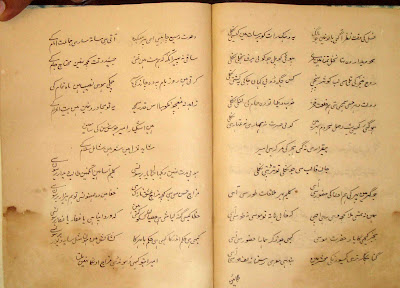Dimensions (HxW): 8”x6.5”
Nature of Document: Manuscript - Urdu Ghazals
Genre: Urdu Poetry
No. of Pages: 37 - 19 images
Pp 1-2

Pp 3-4

Pp 35-36

Pp 37

Minai, Amir Ahmad (1829-1900) – Amir Minai was born on 20h February 1829 in a religious and literary family that had settled in a Lucknow neighbourhood then known as the Mīnāī Mehellāh. It was a neighbourhood inhabited by the descendents of the saint, Shah Mina, whose mausoleum is nearby.
In addition to his preliminary intellectual training at home Amir studied at the Farangi Mahal. He was trained in languages (Persian, Arabic, Sanskrit), philosophy, logic, religion, jurisprudence, history, geography, astrology, and other subjects such as ‘ilm-ul rijāl (the science of Hadith) and ‘ilm-e jafar (the art of divination). By the age of twenty-five he was esteemed as one of the prominent scholars of
Amir was a prolific poet and writer known for his romantic and devotional poetry. He was an immaculate stylist and his epistles, masterpieces of Urdu prose, have been published several times and are often included in Urdu textbooks. However, Amir’s most crucial contribution to Urdu is Amīr-ul Lughāt, the first lexicon of Urdu.
Amir was a master poet who composed in the classical style. Amir’s poetry has been eulogized by the likes of Ghalib, Dagh, and Iqbal. Ghalib wrote to Munshi Shiv Narayan Araam asking him to publish Amir’s ghazals in his periodical Ma‘yār us-Shu‘rā’ which used to be published from
It is generally held that Amir was inspired by Dagh in his poetry. However, this claim is difficult to support. Though a color of the Lucknawi style of poetry and influences from poets like Ghalib and Mir are prominent in some of his ghazals, Amir developed a unique voice of his own. His poetry is marked by a delicate sensibility, keen insight, an impression of his times, and vast knowledge acquired through wide learning. According to Iqbal, his poetry is uniquely lyrical and has an air of gloom which haunts the listener.
Due to his scholarship and wonderful poetry Amir was popular among both plebeians and nobles. His unique poem Kabutar-Nāmah earned him a special place in the eyes of Wajid Ali Shah, the then King of Oudh, who then commissioned Amir for several works including Sharah-e Qudsī/Naghmā-e Qudsī—a treatise on music written in Sanskrit by Wajid Ali Shah; Hidāyat al-Sultān, and Irshād al-Sultān—expositions in Persian of texts by Wajid Ali Shah. Due to the war of
Amir has numerous publications to his credit. His published poetry includes five collections of love poetry (Mirāt-ul Ghaib—a divan, Sanam-khāna-e Ishq—a divan, Johar-e Intikhāb and Gohar-e Intikhāb—collections of independent verses, Mazāmīn-e Dil-āshob—a collection of six vāsokhts, passionate poems of unrequited love), a divan of nāts (Muhammad Khātim-un Nabīyyīn), and six books of religious poetry (Nūr-e Tajallī—a masnavī on the birth of the Prophet, Zikr-e Shāh-e Ambīā—a musaddas on the birth, the incident of mai‘rāj, and the death of the Prophet, Subh-e Azal—a musaddas on the birth of the Prophet, Lailat-ul Qadr—a musaddas on the incident of mai‘rāj, Shām-e Abad—a musaddas on the death of the Prophet, Abr-e Karam—a masnavī depicting tales of various Muslim saints). His published prose includes Amīr-ul Lughāt, Hidāyat al-Sultān, Irshād al-Sultān, Intikhāb-e Yādgār—biographical tales and collection of poetry by poets of Rampur, Khayābān-e āfrīnash—stories of the Prophet, Namāz Kay Isrār—on the usefulness of prayers, Zād-ul Amīr—collection of prayers from Ahadith, and Wazīfā-e Jalīliyāh—a collection of Ahadith for daily recitation. In addition to these works, his letters have been published under several titles including Khutūt-e Munshī Amīr Ahmad and Makātib-e Amīr Mīnāī among others. Moreover, two biographies of Amir have also been published, written by Maikash (Hyderabad, 1920’s) and Syed Asghar Hussain Rizvi (
Amir’s unpublished works comprise of more than 70 manuscripts. Among other things they include an Urdu-Persian dictionary, a divan of Persian, several collections of poetry including masnavīs, ghazals and vāsokhts among other forms, translations, and texts on different subjects ranging from astrology, music, language, numerology, history and religion.
Amir’s name had traveled far and wide within his lifetime. Around forty days before his death he traveled to Hyderabad Deccan on royal invitation where he died of liver failure on 13th October 1900.